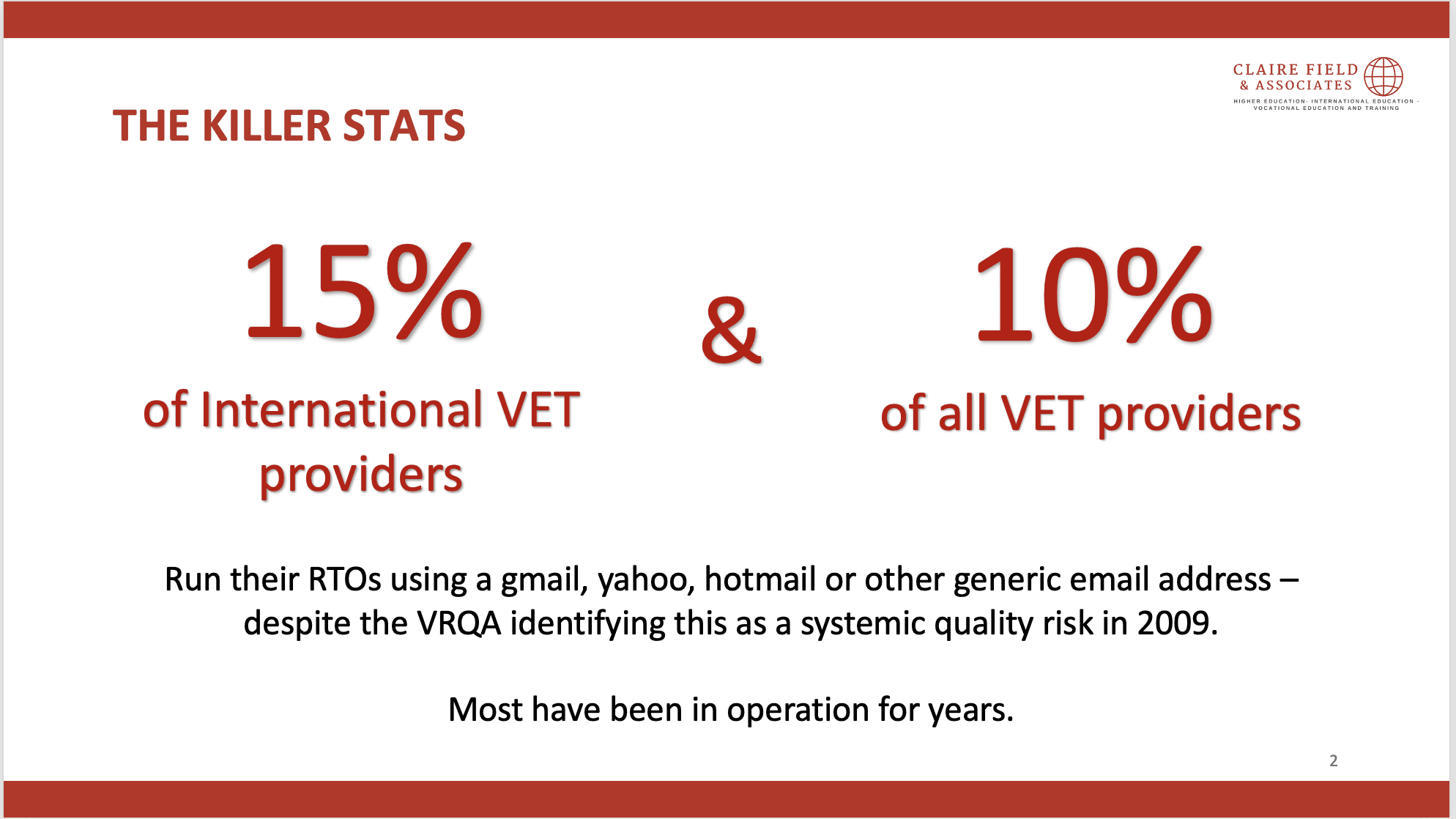
VET’s real integrity risk
This week I was part of a panel session at The PIE Live Asia Pacific event on the Gold Coast. Our session focussed on ‘killer statistics’ that everyone in international education needed to know, and there was a lot to learn from my fellow panellists.
My killer statistics are the two figures on the slide above:
- 1 in 10 (10%) registered training organisations, and
- 1 in 6 (15%) of all CRICOS-registered training organisations
have CEOs who use generic email addresses like gmail and hotmail to run their businesses.
Why do email address details matter?
In 2009, during the first international education crisis in Australia, the state and territories had responsibility for VET regulation.
The Victorian regulator (the VRQA) undertook important, detailed analysis to understand the characteristics of the Victorian providers with significant quality and compliance issues.
They subsequently shared those details with colleagues working in the other state and territory VET regulators – and with myself and my staff (at the time I was working on the establishment of Australia’s first national VET regulator, the National Audit and Registration Agency, which went on to become ASQA).
The VRQA found a high proportion of providers with serious compliance problems used generic email addresses to run their RTOs.
Understandably they labelled it as a clear risk indicator.
The state and territory and NARA staff who went on to work in ASQA knew that, and I understand it was discussed within ASQA multiple times over the years.
Looking at the data in the national VET register (training.gov.au)
In the work that I do each week compiling my weekly subscriber briefings – I continue to see, week after week, a sizeable number of the providers fighting ASQA cancellation decisions and other similar significant regulatory sanctions, have CEOs who use generic email addresses.
Working with a colleague who has significant technical expertise, we have been able to interrogate the data in the national training database, training.gov.au – to understand the size of this problem. (I have waited to go public on this issue – until I could be sure that it was possible to identify all of the providers with this identified quality risk).
What we found in our analysis is:
- More than 380 RTO CEOs use generic email addresses
- A small number of CEOs in this category legitimately use a generic email address to run their business and as such have been excluded from the total (they are small providers in places like regional Queensland and Western Australia with a simple webpage for their RTO which lists the 1 or 2 courses they offer, along with the CEO’s mobile phone number and his/her generic email address eg fred.blogs@bigpond.com as their contact details on their website). For these small, niche providers having their personal contact details on their website and on the national training database makes sense – and hence my decision to exclude them from this analysis.
- The other 380+ CEOs either don’t care that ASQA contacts them (and potentially anyone else who looks for their details on the national database) using their personal email address because (a) they are not really very involved in the day-to-day operations of their RTO and/or (b) they forgot to update their contact details on the national training database after they were granted initial registration.
- More than 140 CEOs of the 920+ CRICOS RTOs use a generic email address.
The email addresses used by RTO CEOs to conduct their business and interact with ASQA include examples such as the following (note that a couple of digits has been changed in each of the following email addresses to protect anonymity – it is not known to me if these providers have compliance issues or merely forgot to update their details – sometimes for years. That is clearly an issue for them and ASQA):
- honey379@gmail.com
- huss294@hotmail.com
- rachael881218@gmail.gom
- ozainpty24@gmail.com
Incredibly 26 RTOs have both their CEO and another key contact on the national training database using different generic email addresses (and there is one RTO which uses different generic email addresses for all three contacts on the national database).
One example of this latter group of providers is:
- a CRICOS provider
- based in Melbourne
- has an approved CRICOS cap of 400 students
- has been in operation more than 9 years
- their CEO uses a hotmail email address, and
- their ‘Registration Enquiries contact’ uses a gmail address.
ASQA must have emailed this provider literally dozens of times in the 10 years since they first lodged their application for initial registration. They will also have been audited multiple times by ASQA – with the auditors presumably communicating with the RTO using the contact details on the national training database.
Despite the government providing ASQA with almost $40 million in additional funding to improve integrity in the VET sector by establishing an Integrity Unit and upgrading ASQA’s digital and data systems… the CEO of this provider and almost 400 others thinks its fine to run their business using a gmail/hotmail/yahoo or similar generic email address.
Meanwhile ASQA is focused on its “ongoing program of regulatory actions against non-genuine and bad-faith providers following a series of intensive compliance investigations”. This work has resulted in just eight providers having their registration cancelled and some of their recent students’ qualifications cancelled.
Only one of the eight providers so far identified through this program of actions appears to have been CRICOS-registered. This is despite the government’s original intent when they provided the extra funding to ASQA that the funding was to tackle the “integrity and quality issues in the VET sector… highlighted by the 2023 Rapid Review into the Exploitation of Australia’s Visa System, (the Nixon Review), the All eyes on Quality: Review of the National Vocational Education and Training Regulatory Act 2011 (the 2018 Braithwaite Review) and the 2023 report of the Joint Standing Committee on Foreign Affairs, Defence and Trade: ‘Quality and Integrity – the Quest for Sustainable Growth’: Interim Report into International Education.”
Sadly, despite this extra funding to fix integrity issues in VET and explicitly to tackle the issues in the international VET sector – we still have 1 in every 6 CRICOS RTO CEOs using a generic email to run their training organisation.




